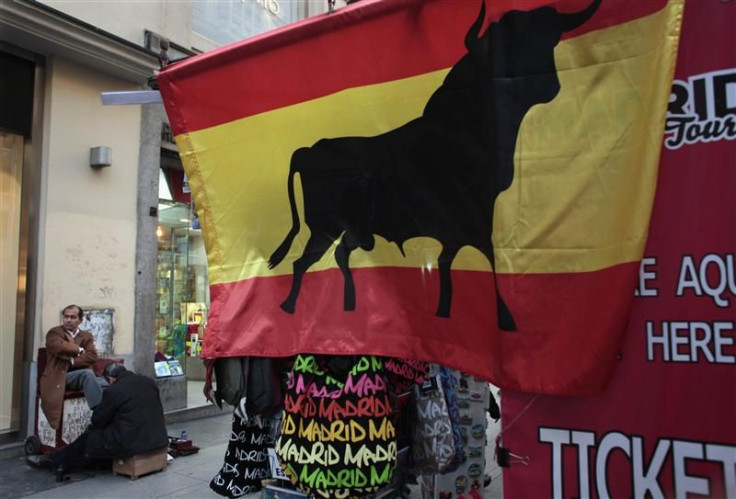Spanish, French Bond Costs Climb, Raising Contagion Fear

Spain and France struggled with government bond auctions Thursday, throwing into sharp relief the threat of larger euro zone economies succumbing to the debt crisis that began in Greece and is already lapping at Italy's shores.
Madrid was forced to pay the highest borrowing costs since 1997 at a sale of 10-year bonds, with yields a steep 1.5 points above the average paid at similar tenders this year. The euro fell on the foreign exchanges in response.
Paris fared a little better, but again had to pay markedly more to shift nearly 7 billion euros of government paper. Fears that the euro zone's second-largest economy is getting sucked into the maelstrom have taken the two-year debt crisis to a new level this week.
The euro zone has got to deliver something which is going to calm markets down and at the moment markets feel like they are being given no comfort whatsoever, said Marc Ostwald, strategist at Monument Securities.
Prime Minister Mario Monti outlines austerity measures aimed at restoring confidence in Italy's strained public finances later, when he goes before the Senate to seek a vote of confidence in his new government.
With Italy's borrowing costs now at untenable levels, Monti will have to work fast to calm financial markets given that Italy needs to refinance some 200 billion euros ($273 billion) of bonds by the end of April.
But no amount of austerity in Greece, Italy, Spain and France is likely to convince the markets without some dramatic action in the shorter term, probably involving the European Central Bank.
Many analysts believe the only way to stem the contagion for now is for the ECB to buy up large quantities of bonds, effectively the sort of quantitative easing undertaken by the U.S. and British central banks.
France and Germany have stepped up their war of words over whether the ECB should intervene more forcefully to halt the euro zone's debt crisis after modest bond purchases have failed to calm markets.
Facing rising borrowing costs as its AAA credit rating comes under threat, France has urged stronger ECB action but Berlin continues to resist, saying European Union rules prohibit such action.
If politicians think the ECB can solve the euro crisis, then they are mistaken, German Chancellor Angela Merkel said, adding that even if the ECB assumed a role as a lender of last resort, it would not solve the crisis.
Investors and euro zone officials hope that if Merkel and others find themselves staring into the abyss, the unthinkable will rapidly become thinkable.
The Germans have made some remarkable changes to their position over the past few months, you have to give them credit for that, it just takes rather a long time. It's Chinese torture, one eurozone central banker told Reuters. They are not drawing lines in the sand as clearly as they were.
ECB policymakers continue to reject international calls to intervene decisively, stressing that it is up to governments to resolve the debt crisis through austerity measures and reforms.
The bank's policy of buying Italian and Spanish bonds in limited amounts is barely holding the line, with the former's borrowing costs above the 7 percent level widely seen as unsustainable and the latter's homing in on that level.
It keeps contagion intact not just for the peripherals but also for the core countries and increases the pressure on the ECB to do something, Nick Stamenkovic, bond strategist at RIA Capital Markets said of the Spanish and French auctions.
Clearly at the moment the ECB is reluctant to do anything.
BANKS UNDER THE GUN
With turmoil reaching a crescendo, euro zone banks are finding it harder to obtain funding. While the stresses are not yet at the levels of the 2008 financial crisis, they have continued to mount despite ECB moves to provide unlimited liquidity to banks.
Fitch Ratings warned it might lower its stable rating outlook for U.S. banks because of contagion from problems in troubled European markets.
And fellow ratings agency Moody's cut ratings of 12 German public-sector banks, believing they are likely to receive less federal government support if needed.
German Finance Minister Wolfgang Schaeuble said Thursday that the eurozone's debt crisis was beginning to hit the real economy and urged vigilance to prevent contagion from infecting banks and insurance firms.
The International Monetary Fund replaced its European director in a sign the global lender is setting a more forceful course of action in dealing with the European crisis.
The fund named Reza Moghadam, currently director of its strategy, policy and review department, as its new director for Europe, replacing Antonio Borges, who last month suggested the IMF could buy Spanish or Italian bonds alongside the eurozone's bailout fund but was forced to backtrack.
Monti starts his first full day as Italian prime minister comforted by an opinion poll that said an overwhelming majority of Italians supported him.
Greece's new technocrat Prime Minister Lucas Papademos faces mass street protests on Thursday, the day after winning a confidence vote for a national crisis coalition that is already split on the need for further austerity measures.
The size and mood of the rally, an annual march marking an uprising against military rule in 1973, will signal just how bitterly a restive public will fight further tax rises and spending cuts that international lenders demand in return for a massive bailout.
Greece's main conservative leader Antonis Samaras has refused to bow to EU demands for a written commitment to the bailout program and called for elections in three months to restore social peace.
($1 = 0.734 Euros)
(Writing by Mike Peacock; editing by Janet McBride)
© Copyright Thomson Reuters 2024. All rights reserved.





















